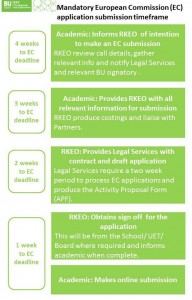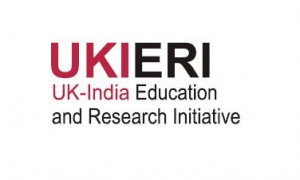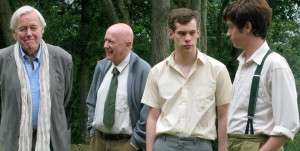Please accept our apologies whilst the Academic Profile Pages are still incorrect. IT are working on correcting the pages. There are issues around random question marks and brackets being added to text, as well as names. Please bear with us whilst the work is carried out on the profile pages and we apologise for any inconvenience caused.
Yearly Archives / 2013
BU research to feature in BJOG’s international Twitter Journal Club
A recent paper by Professor Vanora Hundley is receiving significant interest and is to feature in the British Journal of Obstetrics and Gynaecology’s Twitter Journal Club. For the last two years the BJOG has provided questions and slide sets to help readers evaluate selected papers in their local Journal Club. However, the introduction of the new Twitter Journal Club allows readers across the world to engage in online critical review and discussion. In addition to the paper, participants are provided with a scenario, background to the clinical issue, helpful details about the paper and discussion points. Journal club members participate in the discussion via Twitter using a specified hashtag (#BlueJC). The discussion session starts on 20 March 2013 at 17:00 GMT and is open to anyone to join. For further details see: http://www.bjog.org/details/news/4459851/Blue_JC.html
My Swedish visit
For the past couple of years those of us in the Centre for Media history have been building up our relationship with Lund University where Media History is taught and actively researched. The connection owes a lot to my colleague, Kristin Skoog, who is Swedish but specialises in BBC radio history.
Although I have visited Lund a number of times I have only now spent a week here and in my role as a Visiting Fellow I was asked to contribute to the teaching and research programme.
So I found myself talking to a group of possibly bemused second year undergraduates about BBC radio broadcasts during the second world war. Maybe this was a bit reckless because, as you may know, Sweden was officially neutral during the war and I did wonder how they would respond to the rather gung-ho nature of BBC war reporting. In fact they were very interested and perceptive in their comments.
My next task was to interview two media history PhD students with their supervisors present. Despite not really knowing much about their subjects the conversation seemed to be productive and I certainly learned a lot (about the history of A4 (!) and ‘balloonings’ in Stockholm).
My main challenge was to address the impressive media history research seminar and this time I was prepared with my latest, not entirely legally obtained, audio from the BBC sound archive on the Suez crisis of 1956. Surprisingly I saw in the audience Bente Larsen, a leading figure in Danish radio archives who had popped over ‘the bridge’ (yes, that bridge) to listen. I followed the very impressive and calm young Danish academic, Heidi Svømmekjær, and all went well.
I should add that I do not speak a word of Swedish and so could not use the library. But everyone in Sweden seems to speak very good English.
It has been an extremely stimulating and valuable experience and I would be happy to talk to anyone out there who is interested in building Swedish links.
One final comment; as a guest I was given my own profile page on the Lund University website http://www.kom.lu.se/en/research/mediehistoria/guest-researcher/ What a shame we at Bournemouth are not able to design web profiles of this standard!
Hugh Chignell, Professor of Media History, The Media School. 15.3.2013
New mandatory institutional timeframe for EC and RCUK submissions
As of Monday 25 March 2013 two new institutional changes will be implemented for European Commission and Research Council grants.
European Commission submissions
 A new 4-week institutional timeframe will be imposed for all European Commission application submissions. This timeframe has been created to ensure academics wishing to apply have the appropriate level of support from RKEO needed for their application. This timeframe is outlined on the right.
A new 4-week institutional timeframe will be imposed for all European Commission application submissions. This timeframe has been created to ensure academics wishing to apply have the appropriate level of support from RKEO needed for their application. This timeframe is outlined on the right.
As European Commission deadlines are announced at least 3 months in advance this should not have a significant impact on any staff wishing to apply as a Principal Investigator on a grant. For academic staff approached to be a Co-Investigator on a project less than 4 weeks before the submission deadline can make an appeal by email to their Deputy Dean of Research (or equivalent) and the Pro-Vice-Chancellor Research, Enterprise & Internationalisation.
In order to help you gain the best possible support in terms of grant-writing, partner-searching, funding-call information and other useful help, please let the RKEO EU Pod know you intend to make an EC grant submission. Paul Lynch and Sarah Katon in the EU Pod will be happy to provide further information.
As of Monday, it will be mandatory for all Research Council submissions to go through the Research Proposal Review Service (RPRS). This move is in response to the demand management measures imposed by Research Councils such as the EPSRC and NERC. Many institutions have similar measures to protect academic staff.
You can select whether your application will be peer-reviewed by two internal members of staff only or if you would like an external RCUK grant holder or expert bid writer to also review this. You will be advised on aspects to incorporate into the final proposal after review, which will give it the maximum chance of success.
To start this process, just notify RKEO of your intention to submit an application to one of the Research Councils. Please note that the RPRS can take up to three weeks, so you will need to factor this in to any proposal writing timescales. If you wish to make an application and do not have sufficient time to go through the RPRS, then an appeal by email must be made to your Deputy Dean of Research (or equivalent) and the Pro-Vice-Chancellor Research, Enterprise & Internationalisation.
Book now for the Digital Economy Sandpit
 Feedback from BU staff who have participated in academic sandpits is always positive: “Sandpits stimulate creative thinking and encourage you to step outside of your comfort zone. They are an opportunity to learn from others whose approaches to research may be different from your own” – Prof. Adele Ladkin, School of Tourism, EPSRC Sandpit Participant
Feedback from BU staff who have participated in academic sandpits is always positive: “Sandpits stimulate creative thinking and encourage you to step outside of your comfort zone. They are an opportunity to learn from others whose approaches to research may be different from your own” – Prof. Adele Ladkin, School of Tourism, EPSRC Sandpit Participant
Sandpits provide an intensive, interactive and free-thinking environment. A group of participants from a range of disciplines and backgrounds use this space to get together to become immersed in a collaborative thinking processes in order to construct innovative approaches to issues or questions.
As sandpits involve diverse participants, they force catalysation, collision and collaboration. This produces unique and innovative outputs and fosters new partnerships.
We are facilitating with expert bid writer Dr Martin Pickard of GrantCraft, three 1-day sandpits at BU which focus around relevant Research Council UK cross-thematic areas. The next Sandpit is on Digital Economy Sandpit is being held on 17.04.13
Attending one of the sandpits will:
- facilitate you networking with other researchers across BU who you wouldn’t normally come in to contact with
- allow you to get a fresh perspective from a different discipline on the same issue
- enable you to be part of a multidisciplinary team who potentially bids for Research Council funding
- give you a truly unique experience
Spaces are limited for each of the sandpits and you can register for a place on the Staff Development website.
The research collaboration with Cambridge on the emerging strategic management scheme- Business Ecosystem
I (Dr.Ke Rong) as the principal investigator have received an award from the Bournemouth Small Grant scheme. This project has set up the collaborative research partnership with Dr.Yongjiang Shi (ys@eng.cam.ac.uk), the director of centre for international manufacturing of University of Cambridge. We have explored a new strategic management territory- business ecosystem in a multidisciplinary working environment by integrate the research methods from operation management (Dr.Yongjiang Shi’s expertise) and strategic management (Dr.Ke Rong’s expertise).
After ten months, we successfully completed the project. Specifically, our pilot research explored the evolution and construct of a business ecosystem. This pilot project also led to a funding bid by combining ideas in a multidisciplinary working environment ( strategic management and operation management) and fostering new and long term collaboration with prestigious universities like University of Cambridge. Two journal papers on the business ecosystem have been published and two others are submitted.
Besides, the co-investigator and I also organized a research seminar on ‘Shanzhai business ecosystem’ in the Academy of Management Annual conference in Boston, 08/2012. More than 20 worldwide scholars attended and they recognized that our business school had dedicated to this emerging research theme- Business Ecosystem.
Rufus Stone to screen Monday 18th March at Kimmeridge
“Love, sexual tension, betrayal, abandonment, anger, sadness all simmering under the façade of British politeness”. –previous audience member.
The award-winning short film, Rufus Stone, will be featured by the Media School’s Narrative Group with a screening on Monday, 18th March at 1 pm in Kimmeridge (KG 03). All are invited to attend.
Rufus Stone is the culmination of three years of Research Councils UK funded New Dynamics of Ageing research at Bournemouth. The project, ‘Gay and Pleasant Land? was led by HSC and the Media School’s Kip Jones with a team of researchers and an Advisory Committee made up of older LGBT citizens and their service providers.
The film stars well-known actor, William Gaunt (“The Champions“) in the title role, with Harry Kershaw (“One Man, Two Guvnors“) playing young Rufus. Rufus Stone was directed by Josh Appignanesi (“The Infidel“) with a story by Kip Jones.
Appignanesi describes the plot:
- “Rufus Stone dramatises the old and continued prejudices of village life from three main perspectives. Chiefly it is the story of Rufus, an ‘out’ older gay man who was exiled from the village as a youth and reluctantly returns from London to sell his dead parents’ cottage, where he is forced to confront the faces of his estranged past. Of these, Abigail is the tattletale who ‘outed’ Rufus 50 years ago when he spurned her interest. She has become a lonely deluded lush. Flip, the boy Rufus adored, has also stayed in the village: a life wasted in celibacy (occasionally interrupted by anonymous sexual encounters) and denial (who is) looking after his elderly mother. But Rufus too isn’t whole, saddled with an inability to return or forgive”.
This screening (30 minutes) will be followed by a discussion by Jones on the use of biography, narrative and auto-ethnography in building the story for the film.
Trailer for the film. All are welcome!
Engage with Dorset HealthWatch via Twitter!
 Healthwatch is the new independent, consumer champion for health and social care services in England. The local Dorset HealthWatch are holding a tweetchat on Wednesday 20th March from 1-2pm.
Healthwatch is the new independent, consumer champion for health and social care services in England. The local Dorset HealthWatch are holding a tweetchat on Wednesday 20th March from 1-2pm.
The idea is to discuss how social media can be used to encourage volunteering and participation in Healthwatch during a lunchtime twitter session. Dorset HealthWatch tweet under @HwatchDorset, and the hashtag for the event is ‘#HwatchDorset’.
Twitter chats are discussions that take place on twitter, at a specific time around a predetermined subject. They use a hashtag (#) as a flag that binds a conversation together. Tweetchats are an excellent way to use Twitter to discuss topics with peers.
If you’re already on twitter just use the hashtag #HwatchDorset on Wednesday 20th March between 1pm and 2pm. If you’re new to twitter – register here http://www.twitter.com then search for @HwatchDorset and ‘follow’ and remember to include #HwatchDorset in your tweets.
Please use and promote #HwatchDorset – the first, 10th and 20th retweet we receive will win a £20 shopping voucher. We will also make a donation of £150 to a community group nominated by one lucky chat participant – be in it, to win it…..
This is a great opportunity to engage with a local health third sector organisation on the social media.
Squeezing the pips from a conference with social media
Please forgive the self-publicity, but I would like to share my recent use of social media to promote BU, research, a conference and papers.
Last week, I attended the annual International Public Relations Research Conference (IPRRC) in the US, where I presented three papers, one with a US co-author. It’s the largest conference in the field, drawing 101 papers over three days and attendance in the order of 150-175 academics, graduates and some practitioners.
To broadcast involvement in the conference, I used my personal blog to present a daily summary of interesting papers: http://fiftyonezeroone.blogspot.co.uk/. The blog posts have had over 210 visits so far and were also circulated on LinkedIn, Twitter and Google+. There have been many re-tweets (RTs), plus appreciative emails and direct messages via Twitter.
A short summary of “top 10 research tips” was written for the prmoment.com website which has around 30,000 users, worldwide. It was posted on the site’s blog and is included in this week’s publication: http://blog.prmoment.com/ten-pr-research-tips-from-bournemouth-universitys-professor-tom-watson/
The outcomes of this type of activity will be long-term and hard to measure, but as I was the only UK delegate at IPRRC this year, it has given BU, our research and industry knowledge an international platform of expertise and insight to present ourselves. The capital cost was almost nil, as I used my own netbook, Wi-Fi was free and the time component was less than an hour a day. Try this approach at your next conference or internal event.
BBB Seminar: Bournemouth-Brasilia-Birmingham
As part of the BBB project, funded by Bournemouth University Fusion Investment Fund SMN strand, and Software Systems Research Centre activities, we would like to invite you to our seminar series next week, the week of March 18th 2013, at the School of Design, Engineering and Computing.
BBB project creates a community of interest which involves the computing groups of University of Brasilia, University of Birmingham, and Bournemouth University. The three groups are focused on Software Engineering research and this project involves exchange visits and the establishment of joint work. BBB is working together on a timely research project about adaptive software systems with particular focus on cloud and service computing. We are investigating core engineering foundations which are required to enable software to adapt and respond to the dynamic needs and environments of its users and, also, to respond to their runtime feedback aiming to enhance its service quality. The program consists of the following talks:
Tuesday 19-03-2013
Speaker: Danilo Mendonça, University of Brasilia, Brazil
Title: Compositional Approach for Parametric Model Checking in Software Product Lines
Room and time: P403 (Poole House, Talbot Campus) Start: 15:00 Finish: 15:40
Speaker: Funmilade Faniyi, University of Birmingham, UK
Title: A Self-Adaptive Architecture Approach to Service Level Agreement Compliance in Cloud-based systems
Room and Time: P403 (Poole House, Talbot Campus) Start: 15:40 Finish: 16:20
Speaker: Raian Ali, Bournemouth University, UK
Title: Socially-Adaptive Software: The SOCIAD project Approach*
Room and time : P403 (Poole House, Talbot Campus) Start: 16:20 Finish: 17:00
Thursday 21-03-2013
Speaker: Felipe Pontes, University of Brasilia, Brazil
Title: Enacting distributed and reliable service choreography using context-aware agents
Room and time: P411 (Poole House, Talbot Campus). Start: 15:00 Finish: 15:40
Speaker: Lai Xu, Bournemouth University, UK
Title: Business process management as service & lightweight business process modelling.
Room and time: P411 (Poole House, Talbot Campus). Start: 15:40 Finish: 16:20
Speaker: Huseyin Dogan, Bournemouth University, UK
Title: Systems of Systems (SoS) to Capability Management.
Room and time: P411 (Poole House, Talbot Campus). Start: 16:20 Finish: 17:00
Friday 22-03-2013
Speaker: Malik Almaliki, Bournemouth University, UK
Title: Developing a Software Engineering Framework for Adaptive Acquisition of Users’ Feedback
Room and time: P409 (Poole House, Talbot Campus). Start: 15:00 Finish: 15:20
Speaker: Rami Bahsoon, University of Birmingham, UK
Title: Self-Adaptive Cloud Software Engineering @ Birmingham
Room and time: P409 (Poole House, Talbot Campus). Start: 15:20 Finish: 16:10
Speaker: Genaina Rodrigues, University of Brasilia, Brazil
Title: Variability Management of Reliability Models in Software Product Lines
Room and time: P409 (Poole House, Talbot Campus). Start: 16:10 Finish: 17:00
We hope you will join us.
* SOCIAD (Social Adaptation: when Software Gives Users a Voice) project is funded by EC Marie Curie CIG grantUK-India Education & Research Initiative Funding Available
 The next round of applications for the UKIERI Thematic Partnerships is now open. UKIERI Thematic Partnership funding is designed to support the collaborative costs of joint research projects, including exchanges between research teams in the two countries. The closing date for applications is 31 May 2013. This year there are two categories for funding:
The next round of applications for the UKIERI Thematic Partnerships is now open. UKIERI Thematic Partnership funding is designed to support the collaborative costs of joint research projects, including exchanges between research teams in the two countries. The closing date for applications is 31 May 2013. This year there are two categories for funding:
1. UGC UKIERI Thematic Partnerships (with the University Grants Commission), which covers research, faculty exchange and innovation across all subject areas.
2. DST UKIERI Thematic Partnerships (with the Indian Department of Science and Technology), for the following specific areas:
a. Sustainable energy supply
b. Food production and security
c. Water supply and security
d. Health and Disease
e. Innovation including social impact and intellectual property
f. Research and Science Policy
Full guidance notes and application forms are available from the UKIERI website. UKIERI will organise pre-bid workshops in March and April 2013 to help potential applicants understand the application process for the call and the dates of these will be released on their webpage.
Interested in eHealth? Join the Psychology Research Centre for an informal forum!
On Wednesday 27th March, 2013 the Psychology Research Centre will be holding an informal forum for anyone who is currently doing, or interested in doing, research related to eHealth (e.g. research interests may include understanding how people (e.g. potential patients, patients, health professionals) use the internet for health information and/or intervention). We are informally calling this forum CHIRP which stands for Centre for eHealth Internet Research and Practice and it is open to any staff or postgraduate students at BU who would like to meet up to discuss research plans, ideas and potential collaborations.
The topic of eHealth fits well into the BU research themes of ‘Health, Wellbeing & Ageing’ and ‘Technology & Design’ and we are currently aware of members in DEC and HSC who are currently conducting research in this area.
The aim of this meeting will be to get together and understand common research interests therefore we would ask you to come prepared to talk for around 3 minutes about the current work you are doing (feel free to send a powerpoint slide with details of you interest too).
The forum will be held at 3pm in room P405 at Poole House and Tea, coffee and biscuits will be provided. Please contact Sarah Williams in Psychology by early next week if you are interesting in attending.
Want to know more on the exciting R&D opportunities available in Electronic Systems?
Keen to find out more on the opportunities available for R&D? Then do not miss this event:
‘Starting Small, Thinking Big: Entry-Level funded R&D opportunities in Electronic Systems’ 
at:
The University of West England on Wednesday 10th April.
The purpose of this event is to inform organisations of the type of opportunity that is available from the Technology Strategy Board, through funding programmes such as:
SMART and KTPs.
In particular, detailed information will be given on the current
KTP Call opportunity in Resilient Energy.
Used properly, publicly funded R&D can be a valuable way for companies to develop products, ideas and people. Successful projects and programmes in electronic systems are often built from small, carefully planned beginnings.
To register for the event, and to find out further information please click here
Marie Curie Funding Info Sessions Reminder – Need A Fully Funded Research Fellow ?
The Prize
These schemes provide strong financial support for a Research Fellow in your department for a period of 12 – 24 months on any research topic.
The Catch
The Research Fellow must come from another European Country or International Base worldwide. It is joint application with you and the fellowship candidate – so they must be identified. (If the fellow is already in the UK they must have been working here for less than 1 year in the last 3.)
The Deadline
Deadline for application is August 2013 – but the forms are relatively easy & straight forward – although moderately time consuming. Fellowships will start in early 2014 but this start date could be extended to early 2015.
Intra-European Fellowships (IEF) Deadline Mid August 2013
International Incoming Fellowships (IIF) Deadline Mid August 2013
Note: For people already at the University there is a similar outgoing international Fellowship scheme to enable research periods in other , non European, Labs and Research Centres.
These fellowships are prestigious and highly sought after, especially as they pay very well. There is a difference in emphasis between the two schemes but the overriding criteria is candidate, and host, excellence with respect to the justification of the project rationale. This is all derived from the candidates cv and thus please discuss initially with Martin Pickard who can advise on suitability and fit.
These fellowships are an excellent, and often overlooked, way to expand and compliment a research team. Initial advice is imperative as, again, project structure and rationale with respect to the candidate are very important in determining success and need to be argued and justified around the actual science and project.
Requirements.
One University (Host) and one applicant, of any nationality, other than from than the UK. (candidates may already be in the UK but must have spent less than 12 months of the past 36 in the UK)
The higher the quality of the cv, rated against age and experience, the more likelihood of funding success. Each prospective fellow can only apply for one fellowship but any host can have as many fellows as they want applying to work with the same PI.
The Grant
Typical project period – Minimum 12 months — Maximum 24 months
Fellow income: In excess of 80,000 Euro per year.
University Income: Minimum of 18,000 Euro per year.
Help Needed ??
If you have a research Fellow in Mind (or can find one through networking or your colleague links) the application will not take a lot of time – but a clearly defined and specific approach is required. Guidance notes will be available as well as direct one to one support from our proposal writing specialist Dr. Martin Pickard.
To assist further we have also arranged a series of 2 morning information sessions to be held on the Wednesday 27th of March and repeated again on the Tuesday 16th of April 2013
Information Session 1 – 09:00am – 10:00am
A Brief Introduction to the Marie Curie Fellowship Schemes – for those of general interest.
In addition to the general European topic specific calls under the cooperation programme there are a number of explicit opportunities arising through other schemes – some of which are far more easily accessible and have the advantage of being open to literally any research idea/topic. Several of these arise through the People programme under the Marie Curie calls and this 40 minute plus Q&A information session seeks to highlight some of these opportunities and identify their pro’s and cons so that a clear strategy can be developed to avoid missing these significant, and relatively easy, opportunities.
Information Session 2 – 10:15am – 12:15pm
How to Approach and Structure your Marie Curie Fellowship Application – for those possibly intending to submit a bid.
The structure of any bid (partner interactions, methodology synergy etc.) is critical to the success of an application and forward planning is a key element of winning proposals.
If you are thinking of applying this August this session will illustrate the basic approach requirements for success and show how to structure and present your research application in the correct form of “Brusselese”. A brief, 2 hour, guide to the Marie Curie application process.
Please note: If you are already intending to submit a bid this August then Session 1 will provide very little additional information. Also Grants Academy members who have already attended our Grants Academy 2 Day Bid Writing Workshop will not need to attend Session 1 as this has already been covered in your workshop so we would recommend you book into and attend Session 2 only.
If these are a potential interest to you – don’t miss this exceptional opportunity. Please book in ASAP via Staff Development Booking Link to reserve your space as we anticipate these sessions will be very popular.
Link to ETHICS on the Staff Intranet
The Staff Intranet ribbon has a new ETHICS icon, which will direct you to the Research Ethics page on the blog. Go to the Staff Intranet, scroll to the bottom and click on the right arrow to find the ETHICS icon. This new icon on the Staff Intranet will make it easier for researchers to find information on BU’s research ethics policy and procedures.
BU is committed to promoting and upholding the highest quality academic and ethical standards in all its activities. BU’s research governance and ethics policies and procedures recognize the importance of addressing ethical matters, while supporting the achievement of its collective research objectives. To this end, robust research governance and ethics policies and procedures underpin all research at the University. Further information can be found on the Research Ethics page on the blog, accessible here, or via the ETHICS icon on the Staff Intranet.
CEMP Research & Innovation Bulletin 14.3.13
The CEMP Research & Innovation Cluster bulletin for the meeting on 14.3.13 is here: Cluster bulletin and agenda 14.3.13.
The focus of the cluster is pedagogic research and innovation. Any colleagues interested in collaborating with CEMP to pursue any of the funding opportunities in the bulletin – please email Julian McDougall.
Cluster meetings take place every other Thursday. In the Thursdays in between, the bulletin will be posted here.
FREE: Gender Equality Conference “Athena SWAN and Beyond” @ University of Southampton
Back in September 2012, Professor Matthew Bennett, the PVC for Research, Enterprise and Internationalisation announced in a blog post that Bournemouth University was in the process of applying for membership of the Athena SWAN Charter, which was a positive and significant development for the University.
The Athena Swan charter recognises commitment to advancing women’s careers in science, technology, engineering, maths and medicine (STEMM) employment in higher education and is underpinned by three beliefs:
- The advancement of science, technology, engineering, maths and medicine is fundamental to quality of life across the globe
- It is vitally important that women are adequately represented in what has traditionally been, and is still, a male-dominated area
- Science cannot reach its full potential unless it can benefit from the talents of the whole population, and until women and men can benefit equally from the opportunities it affords
(information taken from http://www.athenaswan.org.uk/content/charter)
The University of Southampton, supported by EPSRC is hosting a Gender Equality Conference “Athena SWAN and Beyond” on the 20 March 2013. This is a FREE event and is a fantastic opportunity for those who are keen to get involved with Athena SWAN.
Event details are as below

To register for the event, please visit this webpage http://www.southampton.ac.uk/diversity/
You can also find out more about the event from here.
Calling all Early Career Researchers!
 R&KEO are keen to know your thoughts as to whether holding an event this summer for Early Career Researchers (ECRs) would be of interest.
R&KEO are keen to know your thoughts as to whether holding an event this summer for Early Career Researchers (ECRs) would be of interest.
The event would be intended to help you reflect and develop the skills you have and help you consider how you can apply your skills now and in the future and aim to help you make more informed choices about the next step of your career.
The event would include some training and then allow you to work in a range of situations such as a simulated business or academic environment with a facilitator. This will help you uncover more about your personal motivations and career.
If you are an ECR please use the voting buttons below to register whether this would or would not be an event you would like to participate in.
[polldaddy poll=6954398]
















 Beyond Academia: Exploring Career Options for Early Career Researchers – Online Workshop
Beyond Academia: Exploring Career Options for Early Career Researchers – Online Workshop UKCGE Recognised Research Supervision Programme: Deadline Approaching
UKCGE Recognised Research Supervision Programme: Deadline Approaching SPROUT: From Sustainable Research to Sustainable Research Lives
SPROUT: From Sustainable Research to Sustainable Research Lives BRIAN upgrade and new look
BRIAN upgrade and new look Seeing the fruits of your labour in Bangladesh
Seeing the fruits of your labour in Bangladesh ECR Funding Open Call: Research Culture & Community Grant – Apply now
ECR Funding Open Call: Research Culture & Community Grant – Apply now ECR Funding Open Call: Research Culture & Community Grant – Application Deadline Friday 12 December
ECR Funding Open Call: Research Culture & Community Grant – Application Deadline Friday 12 December MSCA Postdoctoral Fellowships 2025 Call
MSCA Postdoctoral Fellowships 2025 Call ERC Advanced Grant 2025 Webinar
ERC Advanced Grant 2025 Webinar Update on UKRO services
Update on UKRO services European research project exploring use of ‘virtual twins’ to better manage metabolic associated fatty liver disease
European research project exploring use of ‘virtual twins’ to better manage metabolic associated fatty liver disease